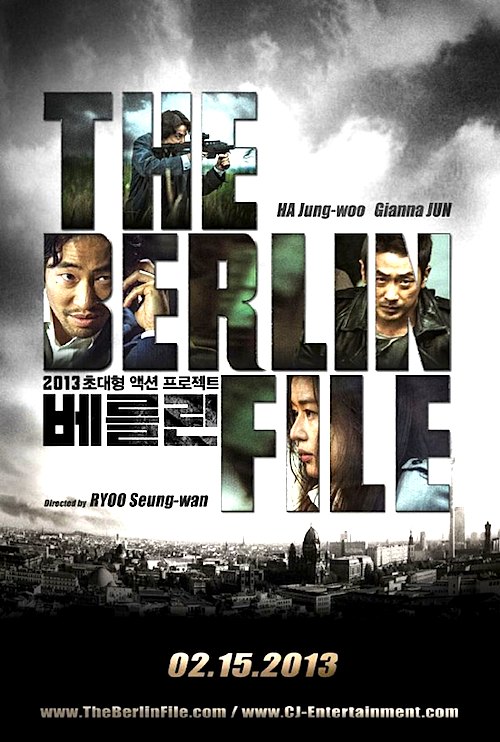By Joe Bendel. Like any good socialist system, power in the DPRK is transferred along hereditary lines. Kim Jong-un has just succeeded his father Kim Jong-il. However, a power struggle for day-to-day control over the country’s lucrative arms dealings, their only source of hard currency, will engulf at least four intelligence agencies in Ryoo Seung-wan’s The Berlin File, which opens this Friday in New York.
Officially, Pyo Jong-seong is a national hero of the People’s Republic. He is so good at his covert duties, he remains a “ghost” to western intelligence databases. Assigned to close an arms sale to an Islamist terrorist group brokered by the Russians, Pyo is quite put out when the Mossad crashes the party. Jung Jin-soo is also rather out of sorts, as well. The South Korean operative was hoping to bust the Northern Koreans, but the third party intervention blew his operation. One of the few remaining Cold Warriors in an office full of appeasers, Jung’s position becomes rather precarious politically. Of course, Pyo is in a tighter spot.
 Technically, Pyo is above reproach, but his wife Ryun Jung-hee is not. As he learns from the Ambassador, Ryun has fallen under suspicion in Pyongyang. Dong Myung-soo, a well-connected special agent, has been dispatched to investigate her as the Israelis’ presumed informant. Pyo has some rather difficult history with Dong, so he cannot expect any favors from the Communist operative. Meanwhile, the South Korean Jung is out to get Pyo to avenge his comrades. A pariah in his own agency, Jung only trusts the council of his CIA contact, Marty, perhaps the film’s only genuinely likable character.
Technically, Pyo is above reproach, but his wife Ryun Jung-hee is not. As he learns from the Ambassador, Ryun has fallen under suspicion in Pyongyang. Dong Myung-soo, a well-connected special agent, has been dispatched to investigate her as the Israelis’ presumed informant. Pyo has some rather difficult history with Dong, so he cannot expect any favors from the Communist operative. Meanwhile, the South Korean Jung is out to get Pyo to avenge his comrades. A pariah in his own agency, Jung only trusts the council of his CIA contact, Marty, perhaps the film’s only genuinely likable character.
A pleasant surprise from Ryoo and the Korean film industry, Berlin File is one of the best espionage films since Tinker Tailor, in which the true villains are North Koreans and Islamic terrorists. America does not factor greatly in the story, aside from the sympathetic figure of Marty. While the South Korean intelligence service does not cover itself in glory, all their dubious actions are done with the intent of making nice with the North. In short, writer-director Ryoo basically nails the geo-political realities. He can also stage a wicked fight scene. Just watching Pyo’s concluding throw-down will make your back wail in pain.
There are indeed some impressive action sequences, but Ryoo is even more effective tapping into bone-deep themes of betrayal and loyalty. He really puts Pyo and Ryun through the wringer and doesn’t do Jung any favors either. As a result, Berlin should be tragic enough to be a monster hit in Korea and sophisticated enough to appeal to American fans of international intrigue.
Ha Jung-woo (who blew the doors off dark thrillers like Nameless Gangster, The Chaser, and Yellow Sea) is all kinds of bad as Pyo, convincingly portraying his conflicted loyalties and mounting disillusionment. Although international superstar Gianna Jun is almost entirely de-glamorized as Ryun, she is still quite a presence, surprisingly affecting in several key scenes. Berlin also boasts a great supporting ensemble, particularly including Lee Kyoung-young, who plays the Ambassador with a moral ambiguity that really keeps viewers off-balance, and John Keogh, appealingly cynical as the friendly neighborhood CIA agent (benefiting from the generous helpings of English dialogue, nicely punched-up by American screenwriter Ted Geoghegan).
Shot almost entirely on location in Berlin and Riga, Berlin File captures the chilly, paranoid vibe of old school Cold War thrillers. Ryoo manages to add the amped-up mayhem of his Korean action pictures (like Troublemaker, for instance), while maintaining the best of both worlds. Highly recommended for fans of action, espionage, and Ms. Jun, The Berlin File opens this Friday (2/15) in New York at the AMC Empire.
LFM GRADE: A
Posted on February 11th, 2013 at 3:22pm.